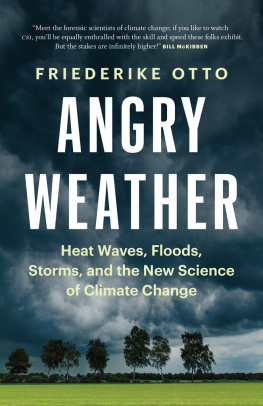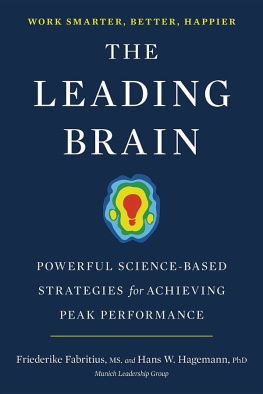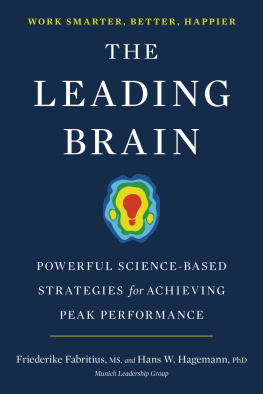Friederike Otto - Angry Weather
Here you can read online Friederike Otto - Angry Weather full text of the book (entire story) in english for free. Download pdf and epub, get meaning, cover and reviews about this ebook. year: 2020, publisher: Greystone Books, genre: Politics. Description of the work, (preface) as well as reviews are available. Best literature library LitArk.com created for fans of good reading and offers a wide selection of genres:
Romance novel
Science fiction
Adventure
Detective
Science
History
Home and family
Prose
Art
Politics
Computer
Non-fiction
Religion
Business
Children
Humor
Choose a favorite category and find really read worthwhile books. Enjoy immersion in the world of imagination, feel the emotions of the characters or learn something new for yourself, make an fascinating discovery.
- Book:Angry Weather
- Author:
- Publisher:Greystone Books
- Genre:
- Year:2020
- Rating:5 / 5
- Favourites:Add to favourites
- Your mark:
- 100
- 1
- 2
- 3
- 4
- 5
Angry Weather: summary, description and annotation
We offer to read an annotation, description, summary or preface (depends on what the author of the book "Angry Weather" wrote himself). If you haven't found the necessary information about the book — write in the comments, we will try to find it.
Angry Weather — read online for free the complete book (whole text) full work
Below is the text of the book, divided by pages. System saving the place of the last page read, allows you to conveniently read the book "Angry Weather" online for free, without having to search again every time where you left off. Put a bookmark, and you can go to the page where you finished reading at any time.
Font size:
Interval:
Bookmark:


Copyright 2019 Ullstein Buchverlage GmbH
Originally published in Germany in 2019 as Wtendes Wetter: Auf der Suche nach den Schuldigen fr Hitzewellen, Hochwasser und Strme
English translation copyright 2020 by Sarah Pybus First published in English by Greystone Books in 2020
20 21 22 23 24 5 4 3 2 1
All rights reserved. No part of this book may be reproduced, stored in a retrieval system or transmitted, in any form or by any means, without the prior written consent of the publisher or a license from The Canadian Copyright Licensing Agency (Access Copyright). For a copyright license, visit accesscopyright.ca or call toll free to 1-800-893-5777.
Greystone Books Ltd.
www.greystonebooks.com
David Suzuki Institute
www.davidsuzukiinstitute.org
Cataloguing data available from Library and Archives Canada
ISBN 978-1-77164-614-7 (cloth)
ISBN 978-1-77164-615-4 (epub)
Copyediting by Dawn Loewen
Proofreading by Jennifer Stewart
Jacket and text design by Nayeli Jimenez
Jacket photograph by Karin Broekhuijsen/Buiten-Beeld/Minden Pictures
Greystone Books gratefully acknowledges the Musqueam, Squamish, and Tsleil-Waututh peoples on whose land our office is located.
The translation of this work was supported by a grant from the Goethe-Institut in the framework of the Books First program.
Greystone Books thanks the Canada Council for the Arts, the British Columbia Arts Council, the Province of British Columbia through the Book Publishing Tax Credit, and the Government of Canada for supporting our publishing activities.

For my Ottos
CONTENTS
PREFACE
I WROTE THIS BOOK in the spring and early summer of 2018, and revised it during what turned out to be a summer that dramatically changed the conversation we are having in society about climate change. Or to be precise, one we are starting to have on a scale that finally seems to come close to what we need to actually address climate change.
This had nothing to do with me, but the science that is described in my book probably did play a role. During the summer of 2018, people in France, the U.K., Germany, India, North America, and many other places around the world not only experienced what climate change feels like but became aware that the very high temperatures they sought to avoid in the shade were not just weather but part of a changing climate. The following northern hemispheric summer of 2019 again saw heat records being broken throughout Europe, including the more than eighty-year-old U.K. record.
Extreme heat was also a key driver of the bushfires that destroyed lives, livelihoods, and ecosystems in southeast Australia. As before, new studies undertaken by the team described in this book found that without human-induced climate change, the heat in Australia would have been at least a degree less intense and less than half as likely as in todays climate. Climate change also made the weather conditions leading to the fires overall at least 30 percent more likely, which means that without climate change the devastation these fires wreaked would have been significantly less severe.
This bookwhich looks at how weather and climate change are linked and how we as scientists can now characterize and quantify humanitys role in extreme eventshas become even more relevant and timely than I imagined it to be. Or, in the words of a German radio station, it provides the arguments for the Fridays for Future movement. Not all of them, certainly, but in this book I describe the birth of a new way of doing climate science. Not only in specialist journals and highly complex reports, but as and when and where people ask scientific questions and need scientific evidence.
Climate change is a fact. Weve known this for a very long time, with experiments confirming the greenhouse effect conducted by a largely ignored scientist, Eunice Newton Foote, as early as 1856 and fully quantified by Svante Arrhenius forty years later. We have observed rising global temperatures over the course of the twentieth century, and the science advisory committee of Lyndon Johnsons presidency warned of global warming in 1965. At the very latest, since the 1990s we have been able to attribute these rising global temperatures to greenhouse gases in the atmosphere from the burning of fossil fuels. However, global mean temperature rise is not killing people and ecosystems directly. Thus the one degree of global mean temperature rise we have today is for most of us just a number. It is a powerful and important number, but since we do not experience it directly, this number only allows (and crucially, requires!) us as a global society to tackle climate change with our intellect, not fueled by direct experience and resulting emotions.
Being human, we find that a very hard task at the best of times. It hasnt exactly been the best of times, though, with powerful interests and a lot of money devoted to characterizing the laws of physics as a hoax. Published research from historians shows that leaders in the oil industry knew about the consequences of continuing their business model (digging up fossil fuels to be burned) as early as the 1950s. Archived internal notes show that they did not doubt the scientific evidence but decided to publicly deny it to keep their businesses going. The United States demonstrates impressively just how successful they were in planting seeds of doubt.
Fast forward into the twenty-first century. Global greenhouse gas emissions are still on the rise (the current temporary dip due to a world in lockdown does not change this picture). Climate change has evolved from a vague future threat to an everyday experience, albeit one that may not yet be recognized as such by everyone. Global mean temperatures of a degree above preindustrial temperatures and carbon dioxide levels in the atmosphere above 400 parts per million manifest as rising sea levels and changes in the frequency and intensity of some extreme weather events. These changes are not just making European summers uncomfortably hot. They threaten decades of development gains, and they pose a clear and present danger to the social and economic welfare of communities and countries around the world. While the global elite was busy ignoring or actively denying human-caused climate change, the problem worsened and devastating weather events proved the science to be correct. The price is being paid by those who always paypeople in developing countries, people who have to work outdoors, people who cant afford insurancein short, people who have profited the least from improved living standards in a fossil-fueled society. And of course the price will be paid most by those who were not alive in the 1960s, 70s, 80s, and 90s, when those with influence chose to ignore climate change. It is the people who have no responsibility for causing climate change who are now taking to the streets, the courtrooms, and hopefully soon all the circles where decisions are made.
These are the facts and have been for many years, apart from the last point. But of course this point is crucial. Thanks to the young people on the streets, we are talking about climate change. And talking is the first step, as a problem that is not addressed cannot be solved. So these kids have achieved what scientists and activists could not achieve in decades; today we talk about climate change almost everywhere. And we do not only talk. Countries like the U.K. have adopted targets to achieve net-zero carbon emissions by the middle of the century; other countries and cities have declared a climate emergency. This is a hugely important first step, but at the moment when it comes to climate, emergency is too often just a word. In order for climate emergency to mean anything it needs to be clearly defined and backed up with legislation. Instead we focus the discussions on individual actions (such as flying). But we cannot reach a net-zero target in thirty or forty years time by holding individuals alone responsible. We live in a system built on the burning of fossil fuels and we need to change the system as a whole and do it quickly. Todays teenagers have already taken a lot of responsibility by telling the world what is at stake and that we need to act now, but we, the older people in powerful positions, need to implement the pathway to a carbon-neutral system. How to do that raises questions of responsibilitysocial, political, and philosophical questions. Changing our global society is not a scientific problem.
Font size:
Interval:
Bookmark:
Similar books «Angry Weather»
Look at similar books to Angry Weather. We have selected literature similar in name and meaning in the hope of providing readers with more options to find new, interesting, not yet read works.
Discussion, reviews of the book Angry Weather and just readers' own opinions. Leave your comments, write what you think about the work, its meaning or the main characters. Specify what exactly you liked and what you didn't like, and why you think so.













